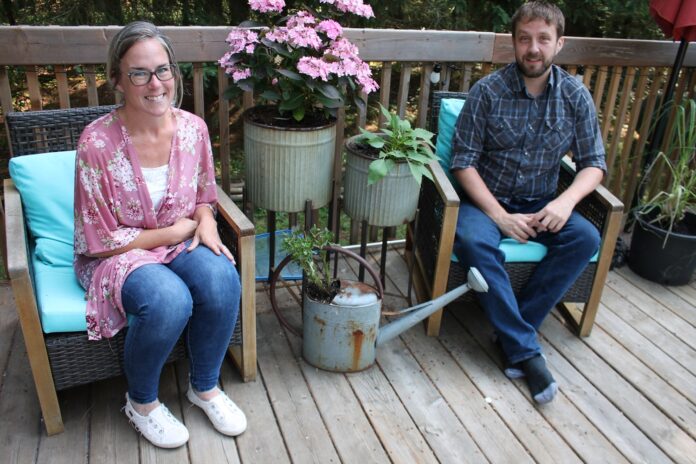When Angela Fearrey’s dad passed away in 2018, she wanted to create a living memorial.
Her dream was to incorporate some of his cremated ashes in her garden, but she found that, unfortunately, they killed plants due to their high acidity.
She began researching – and found scientists in the UK and U.S. had come up with a patented soil that will allow cremation ashes to encourage plant growth, “nurturing both our hearts and the environment,” she says.
Meanwhile, her partner, Simon Mainville, lost his father last fall. He said his dad wasn’t interested in expensive funeral practices, so some of his ashes are now resting in a cigar box he once owned, and in an antique camera he had collected. Mainville said his dad would have endorsed a living memorial, too.
Both fathers were avid gardeners.
The couple has launched Eternal Root, which offers living memorials for family members as well as beloved pets.
“When mixed appropriately with LYLG (Let Your Love Grow) soil, cremated ashes can contribute to the flourishing of plant life in your garden,” Fearrey says. “This natural cycle of growth and renewal helps us find healing and comfort as we cultivate beauty in honour of those we have lost, allowing their legacy to blossom in every leaf and petal.”
Some of their offerings include a memorial tree planting service, incorporating ashes into plant life, and offering do-ityourself kits. Fearrey and Mainville will source plants and trees and get LYLG soil from a Canadian distributor.
While not everyone owns a home or has a dedicated space, she said their living memorials can be placed in pots. There is one next to her as she speaks, a Hydrangea that contains the ashes of a beloved dog. She said Eternal Root can find a pot for someone living in a long-term care home, for example. They also do indoor plant memorials, so people can bring nature inside even in the dead of winter.
They are low maintenance, she points out. One day they may even expand to have a more public memorial garden. Maybe someone could get married under a tree that had grown with ashes from a loved one.
She added, “as much as Eternal Root is about gardening – honouring our loved ones with plants and flowers, we’re also here for grief. We’re going to be starting some grief programs as well in the community, and hopefully working with hospice. I’ve been speaking with Let Your Love Grow about coming up and doing some programs.”
With more than 20 years’ experience as a personal support worker and a registered practical nurse specializing in palliative and hospice care, Fearrey said she’s been “privileged to walk alongside families during their most tender moments.”
She also has lived experience with complicated grief. In addition to losing her dad, she has been divorced, uprooted from her home and garden, and had health setbacks that have disrupted work.
“My dad, after he passed away, would send me pictures. I’d see hearts and I think the hearts were just to tell me to stop listening to my head, listen to my heart. So, that’s why the name Eternal Root came about.”
When she hit rock bottom last fall, she said she was counseled to just get out in the garden. It was about then that Mainville’s dad passed away. She had an epiphany. “I wanted to start doing living memorials. I wanted to do memorial tributes for people.”
Mainville chimes in about seeing his mom deal with her grief process, how everything happened very quickly. “My mother didn’t get to grieve until after the funeral when everything finally quieted down and she got some alone time.”
Fearrey encourages everybody to have ‘the talk’ with their loved ones about death and their wishes.
“We need to have those difficult conversations. In a moment, in a second, everything can change. At some point, we’re all going to step into grief. It doesn’t ever go away, but you find ways to heal.”
Contact Eternal Root via eternalroot.ca, or on Facebook at Eternal Root Living Memorial or email info@eternalroot.ca.






